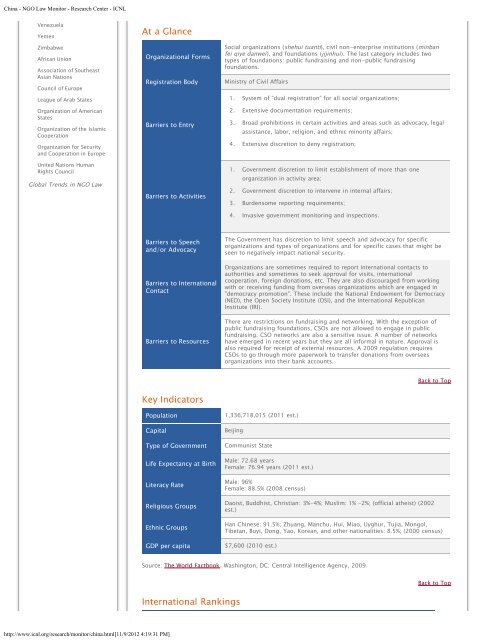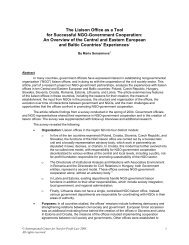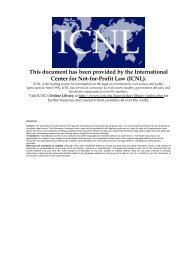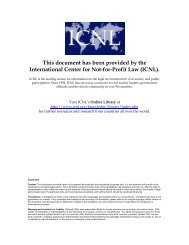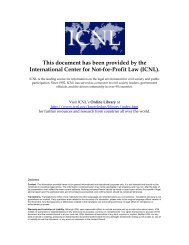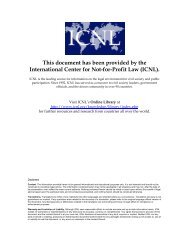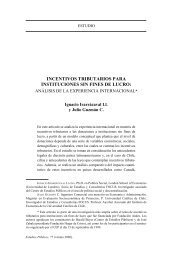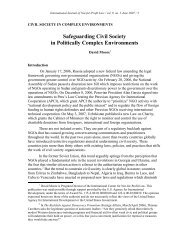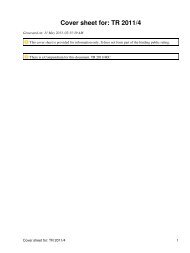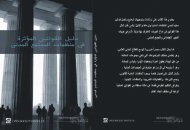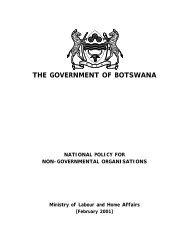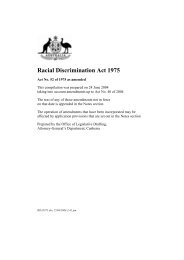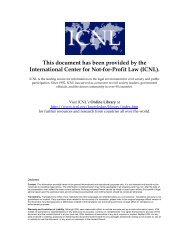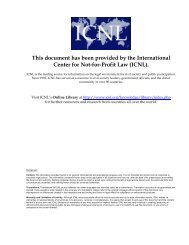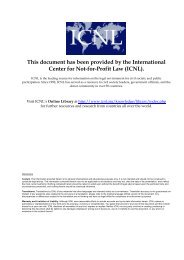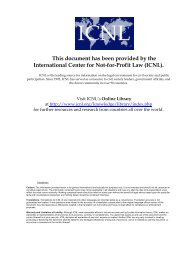NGO Law Monitor: China RESEARCH CENTER - The International ...
NGO Law Monitor: China RESEARCH CENTER - The International ...
NGO Law Monitor: China RESEARCH CENTER - The International ...
Create successful ePaper yourself
Turn your PDF publications into a flip-book with our unique Google optimized e-Paper software.
<strong>China</strong> - <strong>NGO</strong> <strong>Law</strong> <strong>Monitor</strong> - Research Center - ICNL<br />
Venezuela<br />
Yemen<br />
Zimbabwe<br />
African Union<br />
Association of Southeast<br />
Asian Nations<br />
Council of Europe<br />
League of Arab States<br />
Organization of American<br />
States<br />
Organization of the Islamic<br />
Cooperation<br />
Organization for Security<br />
and Cooperation in Europe<br />
United Nations Human<br />
Rights Council<br />
Global Trends in <strong>NGO</strong> <strong>Law</strong><br />
At a Glance<br />
http://www.icnl.org/research/monitor/china.html[11/9/2012 4:19:31 PM]<br />
Organizational Forms<br />
Registration Body Ministry of Civil Affairs<br />
Barriers to Entry<br />
Barriers to Activities<br />
Barriers to Speech<br />
and/or Advocacy<br />
Barriers to <strong>International</strong><br />
Contact<br />
Barriers to Resources<br />
Key Indicators<br />
Social organizations (shehui tuanti), civil non-enterprise institutions (minban<br />
fei qiye danwei), and foundations (jijinhui). <strong>The</strong> last category includes two<br />
types of foundations: public fundraising and non-public fundraising<br />
foundations.<br />
1. System of “dual registration” for all social organizations;<br />
2. Extensive documentation requirements;<br />
3. Broad prohibitions in certain activities and areas such as advocacy, legal<br />
assistance, labor, religion, and ethnic minority affairs;<br />
4. Extensive discretion to deny registration;<br />
1. Government discretion to limit establishment of more than one<br />
organization in activity area;<br />
2. Government discretion to intervene in internal affairs;<br />
3. Burdensome reporting requirements;<br />
Population 1,336,718,015 (2011 est.)<br />
Capital Beijing<br />
Type of Government Communist State<br />
Life Expectancy at Birth<br />
Literacy Rate<br />
Religious Groups<br />
Ethnic Groups<br />
4. Invasive government monitoring and inspections.<br />
<strong>The</strong> Government has discretion to limit speech and advocacy for specific<br />
organizations and types of organizations and for specific cases that might be<br />
seen to negatively impact national security.<br />
Organizations are sometimes required to report international contacts to<br />
authorities and sometimes to seek approval for visits, international<br />
cooperation, foreign donations, etc. <strong>The</strong>y are also discouraged from working<br />
with or receiving funding from overseas organizations which are engaged in<br />
"democracy promotion". <strong>The</strong>se include the National Endowment for Democracy<br />
(NED), the Open Society Institute (OSI), and the <strong>International</strong> Republican<br />
Institute (IRI).<br />
<strong>The</strong>re are restrictions on fundraising and networking. With the exception of<br />
public fundraising foundations, CSOs are not allowed to engage in public<br />
fundraising. CSO networks are also a sensitive issue. A number of networks<br />
have emerged in recent years but they are all informal in nature. Approval is<br />
also required for receipt of external resources. A 2009 regulation requires<br />
CSOs to go through more paperwork to transfer donations from oversees<br />
organizations into their bank accounts.<br />
Male: 72.68 years<br />
Female: 76.94 years (2011 est.)<br />
Male: 96%<br />
Female: 88.5% (2008 census)<br />
GDP per capita $7,600 (2010 est.)<br />
Daoist, Buddhist, Christian: 3%-4%; Muslim: 1% -2%; (official atheist) (2002<br />
est.)<br />
Back to Top<br />
Han Chinese: 91.5%; Zhuang, Manchu, Hui, Miao, Uyghur, Tujia, Mongol,<br />
Tibetan, Buyi, Dong, Yao, Korean, and other nationalities: 8.5%; (2000 census)<br />
Source: <strong>The</strong> World Factbook. Washington, DC: Central Intelligence Agency, 2009.<br />
<strong>International</strong> Rankings<br />
Back to Top


